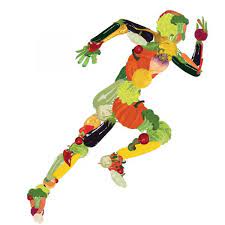Properly Fueling Your Body as a Student Athlete

January 20, 2022
As an athlete and busy student, I know just how hard it can be to fuel your body correctly for peak performance in your sport. Every day you may find yourself eating too little ,not frequently enough, or eating foods that will not fuel your body in ways that will help you perform at your best. These issues are very common among athletes, especially in students who don’t have time or effort to put good food into their body. About 70% of female athletes and 73% of male athletes are not eating enough to fuel their bodies for their sport. When Marcus Owens, the athletic trainer here at HHS, was asked if he has had athletes who have faced problems due to improper fueling, his reply was “Oh absolutely, fatigue, tiredness, they are more susceptible to getting sick. Mostly with nutrition it has more to do with athletic performance.” There are so many factors that can lead to athletes not fueling their hardworking bodies correctly, but there are also solutions to make sure you are consuming to perform your best.
First, you should figure out if you are under-eating, over-eating, or eating the wrong foods before applying changes to your lifestyle. According to the NSW Institute of Sport, some symptoms of improper fueling practices include cravings or unquenchable hunger, poor sleep and/or energy, weight gain or loss, irritability, reduced athletic performance, or injuries. Sometimes these signs can be really subtle, or feel normal to you, so it may be smarter to see a doctor, nutritionist, or your school athletic trainer (such as Mr. Owens).
One common issue athletes have is that they don’t eat, or they replace their meals with unhealthy fast food because they don’t have time to make a healthy meal. We often sleep in too late, have events or practices to go to, have schoolwork or simply just don’t feel like putting in the effort to make a healthy meal. Some ways you can prevent these issues are by prepping healthy meals the week or night before, getting up earlier, finding quick and healthy meals or snacks that you like, or simply just choosing a healthier option on the fast food menu (if there is one). Another one of the more common problems among student athletes is that they simply just don’t feel hungry. However, it is vitally important for athletes to eat at least 3 meals a day(which you can spread into more, smaller meals) to perform well and have proper energy, especially if you know you have practice or a competition that day. If you have trouble eating because you are not hungry, you can pack snacks or meals for school to eat for when you do have an appetite, or find healthy meals that are appetizing to you so they don’t seem as hard to eat.
So, what kinds of foods should you be focusing on? It is important for athletes to get a wide variety of healthy and whole foods in their diet. First, protein is often very hard for athletes to properly consume because their body needs more than the average person. Protein is mandatory for growing and repairing muscles as well as helping your body recover from your training. Protein should consist of about 10-30% of your diet. “On harder workout days you should focus on protein definitely, especially after a workout or practice.” says Owens.
With the proper growth and recovery your body gets from protein, you are able to work harder and improve your performance. Another vital thing for athletes to consume are carbohydrates. They are the source of energy that keep you from lacking in your sport. About half of an athlete’s diet should consist of healthy carbohydrates. “Glucose is converting into energy, so carbs are very important,” said Owens. The glycogen carbohydrates produced are released for quick and effective energy, both when training and at rest. They also help to stop the breakdown of muscles, something that is very common among underfueling athletes. Similarly, fats are essential for healthy organs, sustained energy, and the absorption of important vitamins and minerals. They are great for light and moderate workouts because they release energy slowly yet efficiently. Fats should consist of 20-35% of an athlete’s diet. Lastly, Vitamins and minerals play a key role in the body by converting your food into energy, helping keep healthy bones and organs, muscle repair, blood cell production, and recovery, all of which can enhance your athletic training.
We often think that rest days deserve less food because we are doing less work. However, Owens has something different to say. “I think you should eat more. Your body needs to repair itself from the hard work it’s doing.” An athlete’s body is at prime recovery whenever it is resting, so you should be eating to recharge and refuel. “On rest days you have that leeway to recover, so you should definitely focus on protein and other important food groups”
Eating as a student athlete comes with its challenges, but it is important to give your body the care it deserves.


